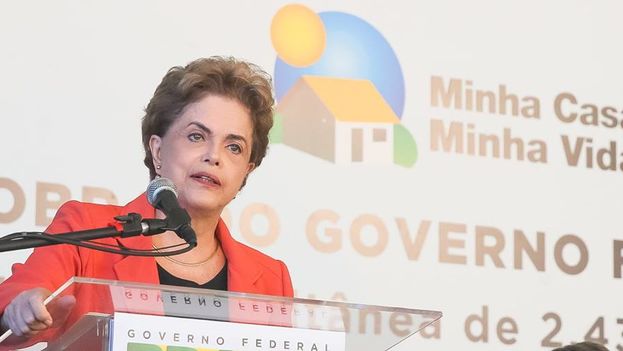
14ymedio/Agencies, Havana, 13 May 2016 — The suspension of the president of Brazil, Dilma Rousseff, is bad news for Cuba, which, despite detente with Washington, is feeling the effects of the recession affecting its allies in South America and Africa. Brazil will review its short-term policy toward the island, as revealed on Friday to Reuters, by a diplomat from that country who was stationed in Havana.
Over the past 13 years, the Government of Brazil provided Havana with at least 1.75 billion dollars in loans on favorable terms, resulting in criticism from the opposition, which is also angered by the “More Doctors” program, which sent some 11,400 Cuban doctors to work in Brazil.
These projects will be reexamined after the vote in the Brazilian Senate this Thursday and the ouster of president Rousseff for allegedly falsifying public accounts.
“There will be a short-term review of our policy toward Cuba because the money has run out. All this is not on hold,” said a Brazilian diplomat who asked to remain anonymous.
Some of the Brazilian loans were spent on the expansion of the Mariel Special Development zone, with repayment periods of 25 years at rates of between 4.4% and 6.9%, according to official data from Brazil. The detractors of this policy believe that the terms of the agreements have been extremely generous to a country like Cuba, with recognized solvency problems.
It is not expected that the interim government led by Michel Temer will end the collaboration with the with the Cuban doctors program working in Brazil since 2013, although it will not contract with new doctors. “This model of cooperation is debatable and he will not support, although I doubt they throw the Cuban doctors out of the country,” a diplomatic source told Reuters.
Last month, Rousseff extended the health services contract for three years, a measure that is currently pending in Congress.
Cuban medical personnel work in some of the remotest regions of Brazil, where they enjoy the support of local authorities. The holding of municipal elections in October is one of the factors that Congress should consider before opting for a drastic interruption of the program of cooperation.
Allies like Venezuela, Brazil and Angola have been used their enormous oil revenue during the boom years—now diminished by the very low price per barrel—to pay for medical and educational services from Cuba, making these a principal source of hard currency for the island..
The thaw reached by President Raul Castro with the United States has been a boost for tourism, but revenue from this sector accounts for only about a third of the seven billion earned in 2014 through the export of health and education services.
The Government of Cuba began to cut imports and request longer deadlines for payment to foreign suppliers last year, and is falling behind in its obligations this year, according to Western diplomats and businessmen. “Clearly, they have a liquidity problem. Some of our companies receive payments and others do not,” a European ambassador told Reuters on Monday.
The official forecast points to a slowdown in economic growth for 2016 compared to 4% increase recorded last year.
